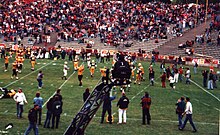German Bowl
The most-played match up in the history of the game is the Braunschweig Lions versus the Hamburg Blue Devils, having been played six times, last in 2005.
[4] The early years of the league were dominated by two teams, Frankfurt and Ansbach, who met each other in the first three editions of the German Bowl.
The era of the Frankfurter Löwen came to an end soon afterwards and the club went defunct in the mid-1980s, while the Ansbach Grizzlies continued to be an outstanding team, playing in all of the first eight German Bowls.
After that, the era of the Düsseldorf Panther versus Ansbach Grizzlies rivalry began, with the two teams meeting in the next four finals.
With the 1986 final, the golden age of the Ansbach Grizzlies ended and the club disappeared from the top level altogether by 1991.
[1] The most dominant era of any team in the sport in Germany begun in 1997, when the Braunschweig Lions reached and won the German Bowl for the first time.
After that, the Braunschweig Lions set a new record, winning four German Bowls in a row, beating four different teams in the finals.
The 2011 season saw the end of an 18-year title drought for the south, when the Schwäbisch Hall Unicorns defeated Kiel 48–44 to carry off the national championship for the first time.
[5][6] The Unicorns repeated their 2011 title in 2012 in the highest-scoring German Bowl to date winning 56–53 on a late field goal, while the 2013 title went to a resurgent and renamed Braunschweig, now playing as the New Yorker Lions in a close 35–34 victory against the Dresden Monarchs in their first German Bowl appearance.
The Lions won their ninth German Bowl in 2014 with the highest-ever winning margin, defeating the Schwäbisch Hall Unicorns 47–9.
Between the end of the golden era of the Ansbach Grizzlies in 1986 and the rise of the Schwäbisch Hall Unicorns (who first reached the German Bowl in 2011), southern clubs have only made five appearances in the championship game of which only one was successful (the Munich Cowboys in 1993).
